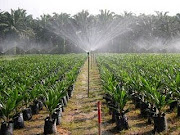Rubber has equal importance to M'sia as palm oil
The StarBizOnline, Tuesday April 20, 2010
RUBBER has equal strategic importance as palm oil to Malaysia. Its cultivation is no longer for latex alone but other purposes, leading to the establishment of a multi-billion ringgit integrated rubber industry.
The growing versatility of the crop – from latex for tyre and glove manufacturing to rubberwood for furniture making – has driven Malaysia to activate its replanting programmes and allocate more funds to beef up existing rubber growing zones in Peninsular Malaysia. It has also lead to the opening of new and larger planting hectarage in Sabah and Sarawak, totalling 30,000ha under the Ninth Malaysia Plan. Sarawak has about 1.5 million ha and Sabah about 400,000ha available for rubber cultivation.
In fact, Sabah and Sarawak are seen as vital new rubber growing zones to boost Malaysia’s dwindling natural rubber output which had dipped to 1.13 million tonnes in 2008 from 1.2 million tonnes in 2007. Both states were targeted to add another 35,000 tonnes a year to the current total production of 101,000 tonnes. Having said that, some quarters feel that active replanting and opening up of new hectarage for rubber are not the only answers to address the dwindling natural rubber production issue.
To ensure resilience in the sector, rubber planters including smallholders will need to be exposed to new varieties and clones; infrastructure in the remote planting areas should be improved; and changes made in the agriculture management practices and policies. The current climate change, for example, has a big impact on the growth of rubber trees. This development warrants reviewing some of the existing rubber zones in the peninsula. One suggestion could be for all “traditional” rubber zones with lacklustre yields to be remodelled via adaptive management using suitable species and clones.
Throughout the years, the Malaysian Rubber Board (MRB) via the Rubber Research Institute has been diligently producing high quality timber latex clones such as the RRIM 900 series, RRIM 2000 series and the latest RRIM 3000 series, that have resulted in high-yielding latex and bigger girth trunks for timber production. Another important factor is to seriously consider advanced research in soil conservation, water storage and management. This will help promote low tillage and maintenance of permanent soil cover that increases the soil organic matter and reduces the impact from drought, flooding, erosion or heavy rain.
In addition, there should be an efficient fertiliser programme, particularly among smallholders, which contribute about 94% of the country’s total rubber production. Smallholders are often perceived as inefficient given their low crop yield due to the lack of good agriculture practices as well as improper management skills.
On average, rubber smallholders produce about 1,100kg of latex per hectare a year compared with a potential production of about 2,500kg. The current average crude palm oil production among smallholders is about 10 to 15 tonnes per hectare a year versus a potential yield of 20 to 30 tonnes.
Nestlé water unit sale reportedly underway
6 hours ago





